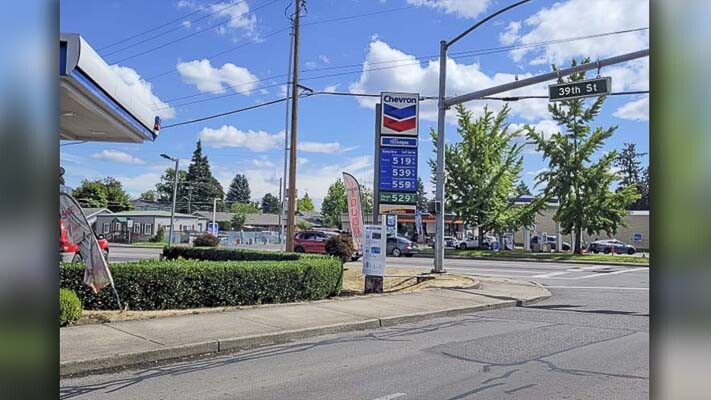
Todd Myers believes it is unlikely that the governor or legislators will take steps to reduce the burden of increasing energy costs on families and businesses
Todd Myers
Washington Policy Center
The results of the latest auction of CO2 allowances were announced and the price continues to rise, increasing 12 percent above the amount from just three months ago. The price hit $63.03 per metric ton of CO2, which amounts to about 50 cents per gallon of gasoline and 61 cents per gallon for diesel.

The high price again exceeded the cost containment cap, triggering another special auction to put additional CO2 allowances on the market in an effort to reduce prices. Washington has surpassed the cost containment cap twice in just three auctions. California has never done that in the decade their system has been in place.
There are growing indications that the Climate Commitment Act (CCA), the formal name of the tax on CO2 emissions, is broken. Prices are much higher than Ecology predicted just last year (they said the price would be $41 per metric ton of CO2) and are nearly 80% more expensive than California. Washington families, businesses, farmers, and others are paying far more but aren’t receiving any more environmental benefit. Once again, Washington politicians have chosen an extremely expensive and relatively ineffective policy.
Washington’s climate law is needlessly restrictive and is designed primarily to increase taxes, not to reduce CO2 emissions. Every new special auction slightly reduces costs now, but the additional emissions credits have to be made up in the future, increasing prices in upcoming years. If we keep breaking the price caps, triggering more special auctions, borrowing from the future to pay for high prices now and creating a significant debt in the future, the system could begin to spiral. At some point the bill for the shortfall in credits will come due.
By now, all but a few political holdouts admit the CCA is driving prices up significantly. Even the Washington State Utilities and Trade Commission (UTC) admits the CCA increased the price of natural gas for home heating. The political cost of those increases mean that the Inslee Administration and legislators are denying the increases or trying to hide them (like the UTC).
When politicians feel obliged to hide the impact of their policies, they know they are harmful, even if they refuse to fix them for ideological or political reasons.
The discussion about the economic and price impact of the law has been consistently dishonest, which means there is little hope that the Governor and others will take steps to cut the extremely high energy costs the climate law is creating.
Washington’s climate law needs a significant overhaul, because even Ecology’s low projections show costs increasing through 2030. Two things should be done in the near term.
First, waive the state’s CO2 target and cap prices at California’s price. Our extremely aggressive 2030 target is a big driver in the excessive price. No amount of fiddling with the system or special auctions will make costs reasonable as long as the cap is so extreme.
Second, we should remove any restrictions on private CO2-reduction projects, sometimes called “carbon offsets.” Ecology’s own analysis shows we could reduce the same amount of CO2 for lower cost by allowing innovators to find alternative ways to cut emissions. Even as the environmental community attacks carbon offsets, they support spending government money on projects that are literally identical. For example, Washington’s taxpayer-funded Clean Energy Fund offers grants to projects like carbon capture to reduce atmospheric CO2. However, if a successful carbon-capture technology was actually created, state law would prohibit it from being used to meet requirements of the CCA. Fund a technology, then ban it. It is absurd.
Elected officials should encourage all CO2-reducing innovation in order to meet the state’s climate goals at an affordable price. The Governor and legislators don’t want that, however, because although allowing innovative approaches to cut emissions would help meet Washington’s CO2 targets, the money for those projects doesn’t go to the state. It is clear that the Governor is prioritizing increased taxes over reducing CO2 efficiently.
At this point it is unlikely that the governor or legislators will take steps to reduce the burden of increasing energy costs on families and businesses. Denial and distraction are likely to be their preferred strategy. And energy costs will keep rising.
Todd Myers is the director of the Center for the Environment at the Washington Policy Center.
Also read:
- POLL: Why did voters reject all three tax proposals in the April 22 special election?Clark County voters rejected all three tax measures on the April 22 special election ballot, prompting questions about trust, affordability, and communication.
- Opinion: The war on parental rightsNancy Churchill argues that Olympia lawmakers are undermining voter-approved parental rights by rewriting key legislation and silencing dissent.
- Opinion: An Earth Day Lesson – Last year’s biggest environmental victories came from free marketsTodd Myers argues that Earth Day should highlight free-market solutions and grassroots innovation as more effective tools for environmental stewardship than top-down mandates.
- Opinion: Time to limit emergency clauses and give voters a choiceTodd Myers urges the governor to remove emergency clauses from bills that appear intended to block voter input rather than address real emergencies.
- Letter: C-TRAN Board improper meeting conductCamas resident Rick Vermeers criticizes the C-TRAN Board for misusing parliamentary procedure during a controversial vote on light rail.










